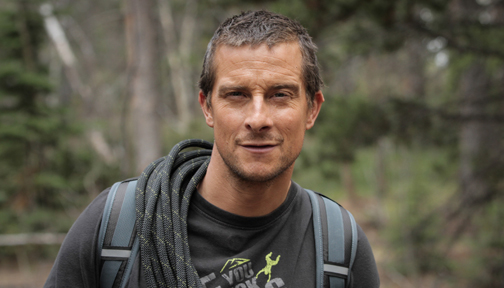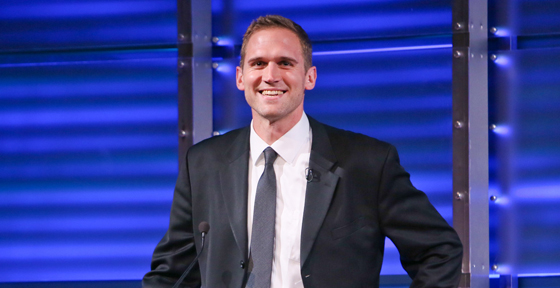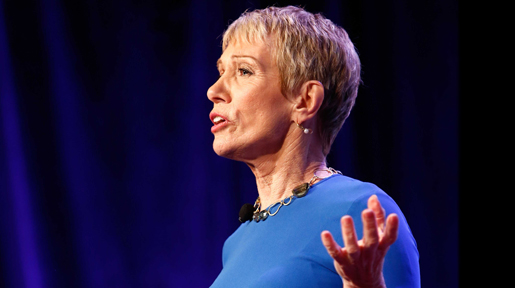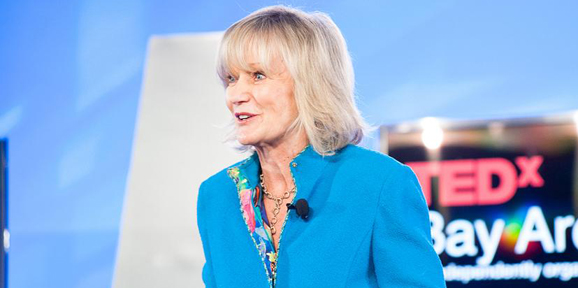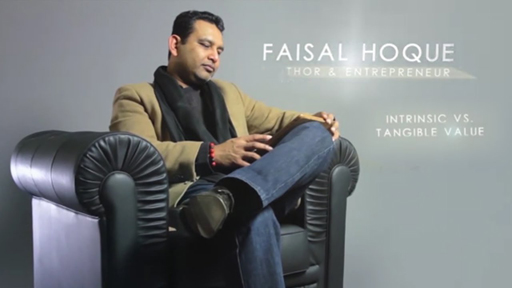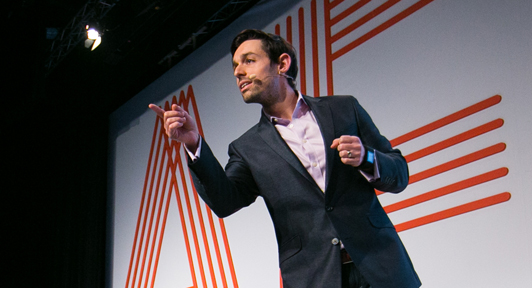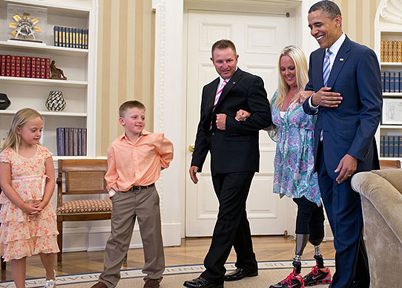
Inspiring Mental Toughness, with Stephanie Decker
| “Comfortable” would be a good word to describe my life prior to March 2012. I was still trying to figure out what I wanted to be when I grew up. | |
| |
 | You are admired for being a very strong and determined person. What do you accredit your personal strength to? |
 | That’s a tough question right off the bat. I attribute much of my strength and determination to the man who raised me. We grew up pretty bare bones; we had a roof over our head and food on the table but sometimes it had its scary moments. He took a risk, started a business with just a GED, and built a company from the ground up, a true rags-to-riches story. I admired him for his work ethic, his ability to risk and put it all on the line to build a better life for his family. It came with many sacrifices;sometimes he wasn’t around much. He would sleep on the couch at work.
His hard work paid off, though, not just in the monetary sense but the priceless values his example instilled in me. I learned mental toughness, perseverance, positivity, and that you can find something great, even in a bad situation. |
 | What was your life like prior to the March 2012 tornado? |
 | I think we were your average, typical American family of four. We worked, we played, and we were (and still are) those crazy parents that spend more time in the car running their kids to and from practice than doing anything else! We didn’t realize it at the time, but we were in our own little bubble, and that was not good thing. We rarely looked at the world outside of our family of four to see how we could help others. “Comfortable” would be a good word to describe my life prior to March 2012. I was still trying to figure out what I wanted to be when I grew up. |
| All of us have bumps in the road and struggles in our life but what I figured out is that we all have the ability to do things we couldn’t even imagine. | |
| |
 | How did you manage to stay positive during your rescue and recovery? |
 | I am not sure positivity was in my thinking during the rescue; I was running on pure adrenaline and determination. Being an athlete, I was “back in the game.” I had to figure out how to hang on and how to survive. I wasn’t done living this life yet and I had a lot to live for.
Positivity was definitely a part of my recovery. My children walked away without a scratch or a bruise. Any mom or dad would take that versus the alternative; this story would have been very different otherwise. Once the TV cameras go away, and friends and family go back to their daily lives, you are still there, having to deal with the reality of what just happened. People ask me time and time again: How do you stay so positive after all that you have been through? How do you keep smiling? I have a simple answer: being positive is a CHOICE. You choose how you handle adversity in your life. You decide whether your outlook is bleak or hopeful. All of us have bumps in the road and struggles in our life but what I figured out is that we all have the ability to do things we couldn’t even imagine. We all have talents and skills that we haven’t begun to reach for yet. I can promise you that I didn’t know it was in me. It’s there; we just have to have the courage to find it. How you handle situations that seem insurmountable separates the bad from the good and the good from the great. I believe you have to make the CHOICE to be great. |
 | What advice would you give to people who are unsure of how they can support a co-worker, friend, or family member who is going through a difficult situation? |
 | There are some definite dos and don’ts. First I will touch on the don’ts.
Everyone wants to help and they have the best intentions but don’t tell someone it’s going to be ok. You just don’t know that. Don’t tell them you understand, because you really can’t unless you have been there. Don’t tell them over and over again you are so sorry for them; your pity is not welcome even with the best of intentions. Here are some things I found helpful. Do tell them, “I know you are going through a difficult time and I am praying for you”, “sending positive vibes”, or whatever it is that you believe in. Do bring them meals. Start a train of people who help feed their families. This was a HUGE help to Joe and the kids. Do take some of the burden off. For example, just go and cut their grass, wash clothes, or other mundane things that you just can’t imagine doing when your family is going through something very difficult. One of the greatest gifts I was given was meeting Oksana Masters, who is a Paralympic rower, cyclist, skier and now, a dear friend. She is also a bilateral amputee who walked into my house after I had just gotten home from rehab and if she hadn’t been wearing shorts, I would have never known that she had prosthetics. She gave me HOPE and THAT was a priceless gift. She was someone who had the same challenges that I was going to have and she wasn’t just coping with them - she was excelling! |
| I have always told my son, you have been through the most horrifying experience you will ever have in your life...There isn’t ANYTHING you can’t do after what you have gone through. | |
| |
 | How have you helped your children navigate through the changes they experienced after the tornado? |
 | Having a strong mother and a solid family foundation has really helped my kids. If you met them today you would be amazed. Of course we all like to brag on our kids, but really, they don’t fear tornados or storms and have shown true strength and courage by moving on in their lives.
I have always told my son, you have been through the most horrifying experience you will ever have in your life. You have handled it like a true fighter. There isn’t ANYTHING you can’t do after what you have gone through. Immediate counseling and watching mom get back to normal was the best therapy in the world. Two months after the accident I was already up on prosthetics and driving, albeit with only one prosthetic leg, but still, that’s good progress. Slowly but surely, I worked extremely hard to gain my independence back, and watching mom “get there” was exactly what they needed to move on with their lives. |
 | Despite losing your legs, you were determined to be able to walk again. What was the process like, turning that goal into a reality? |
 | I figured I had two choices: I could lie in bed and feel sorry for myself or I could find a way to walk again. I can’t be the only one that has lost their legs and wanted to walk, right?
I was motivated to have my life back, so I would set goals for myself. I was going to run, swim, and play with my kids, but I didn’t realize the uphill battles I would face. There were setbacks, revision surgeries, people telling me I would never be the same, that I would never have the life I once had, that I would never get out of a wheelchair and depression would be a mainstay in my life, and that my husband wouldn’t find me attractive anymore. My mental toughness stepped up, though. I realized that everything I had trained for the last 37 years was preparing me this moment. Determination had taken over and I was going to walk again. |
| When I walked into the oval office arm-in-arm with the President of the United States, I knew I had about twenty minutes to bend his ear so I was going to take advantage of the opportunity. | |
| |
 | How did you convince the U.S. Military to let you be the first civilian to use the X3 Ottobock prosthetic legs? |
 | This did take some convincing, but I had a little help. Ok, I had a lot of help. My family and I were invited to the White House to meet with Mr. President Barack Obama. When I walked into the oval office arm-in-arm with the President of the United States, I knew I had about twenty minutes to bend his ear so I was going to take advantage of the opportunity. I had a purpose and a plan to change parity laws and open the door of technology to everyone.
I’ll never forget when I spoke to him about getting the X3, he said “Anita (his secretary), get in here, write this down, and let’s see what we can do about getting Mrs. Decker this X3”. My husband and I were skeptical to say the least that it would actually happen; however, I stayed in touch with his personal medical doctor and secretary and true to his word, almost a year to the date we visited, an X3 showed up on my doorstep. Due to a combined effort by Mr. President and myself, the Walter Reed military base finally gave civilians access to the same technology as our US military, and it truly had a ripple affect. We immediately began to see police officers, EMTs, and firefighters receive this amazing technology, which actually enabled them to get back to their jobs protecting our citizens. It was incredibly inspiring to watch these amazing people finally get their lives back. |
 | Could you please tell us about the Stephanie Decker Foundation? |
 | William Barkley once said, “There are two great days in a person’s life. The day we are born and the day we discover why.” It took me 37 years but I finally found my “Why”. Our Foundation pushes for continued research and funding for technology and resources to everyone that wants, desires, and is motivated to have their life back after limb loss. We also provide scholarships to limb different children to attend a sports camp. (One day we hope to host our own camps.) We believe that all children should have the opportunity to play able-bodied sports and that with the right tools, teachings and coaching they can be like anyone else. As you can tell, THIS has become my passion. I jokingly tell my kids, I have finally figured out what I want to be when I grow up and it only took me 37 years! |
| Typically, anything worth having in life doesn’t come easy. Fight for it and fight for yourself, because you are worth it. | |
| |
 | What are some of the biggest challenges that people with prosthetic limbs face? |
 | Amputees have been silent for decades and we are just recently truly hearing and understanding the struggles that come along with losing a limb or being born without one. Let’s just start with body image and fitting in: we live in a society that in many ways bases who you are by what you look like. Being different can be hard and brutal at times - not to mention the extra challenges it poses for young kids who are limb different as they go through elementary, middle, and teenage years.
Next, let’s look at the difficulties in learning to use a prosthetic device. It took me a good solid year before I was able to walk well, and coming from someone who had always had two natural legs and was impatient to boot, the struggle was REAL. Some of the best advice I can give someone who needs to be fitted with prosthesis is find a good prosthetist. There is an art to what he or she does and not everyone can do it. Do your homework and conduct interviews like you would for a job so that you find someone who is going to help you get a great fit and tailor your needs to the lifestyle you want to live. Do you want to be active and work out? Do you just want to be able to get to your car, or transfer from a wheelchair to a chair? There are tons of different levels and each person is different. The last challenge I will mention is insurance. Many times insurance companies do not want to provide you with what you need for your lifestyle. Don’t settle. Advocate for yourself and make them listen. Typically, anything worth having in life doesn’t come easy. Fight for it and fight for yourself, because you are worth it. |
 | Could you tell us about the legislation you’ve advocated in the Kentucky Senate? |
 | I was pretty fortunate to get the best prosthesis available. My insurance company has been phenomenal; however, it isn’t that way for everyone. I decided to enact a bill that required insurance companies to pay for a patient’s prosthesis based on their activity level. Does everyone need a genium or X3 prosthetic? No, but those that want to be active, run, or walk do deserve the best technology available.
My message to lawmakers was simple: what if tomorrow your daughter or son was in a car accident and lost their leg? Would you not DEMAND the best technology for them? Wouldn’t you do everything in your power to help them get their life back? What many people - not just lawmakers - fail to see is that you never know when it could happen to you. You never know when it will impact your life or your child. Believe me, I never thought this would happen to me. To bring Stephanie Decker to your organization, please contact Michael Frick at: Mike@Speaking.com |

